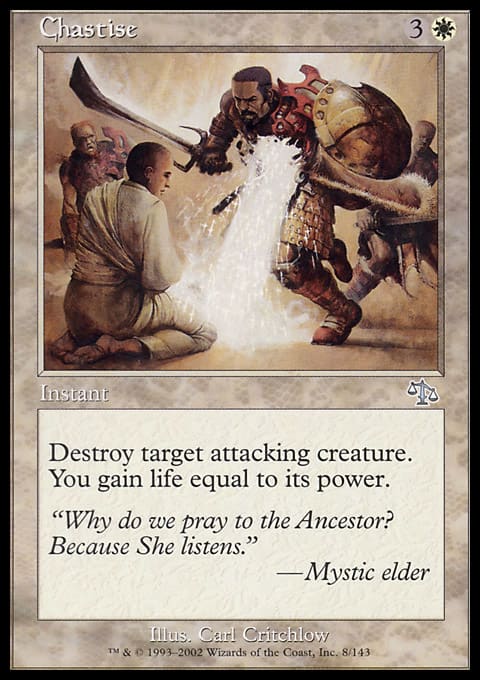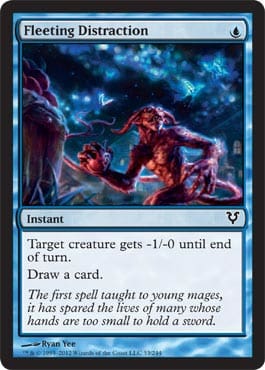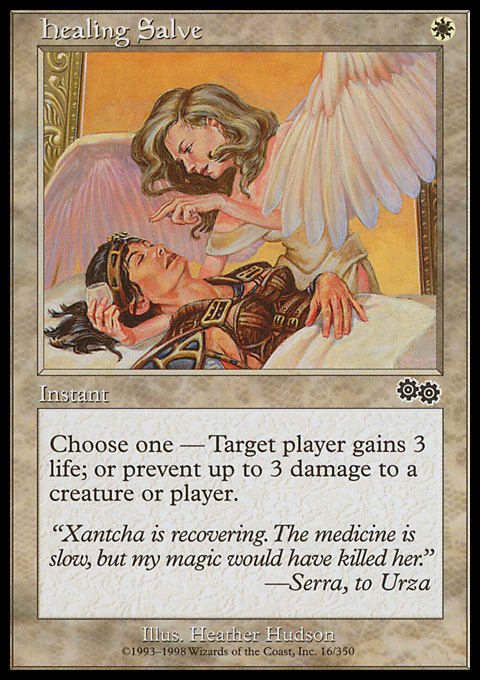A question for you all: Who here is kind? I’m not going to define a standard here—if you hold kindness as an important value, if you make an effort when you can, you count. Thank you for all you do. I see a lot of caring in our community, from big initiatives like Gamers Helping Gamers to smaller but no less meaningful moments like our own @RevisedAngel using her medic skills to patch up a judge at Grand Prix Las Vegas.

Now for a trickier question: Who here is kind to yourself? Again, I’ll let you set your own standards, but if you’re like a lot of people, it’s something you haven’t even really thought about. I think about it on a regular basis and still find it much more difficult than being kind to others.
This was starkly illuminated for me during my first year of graduate school. We were reviewing Second Step, the curriculum we would be using to teach social and emotional skills to elementary school children. Explain to the children that everyone makes mistakes, it instructed us. Share with them some things that you say to yourself when you make a mistake.
Well, several things came to mind for me, and they were certainly not appropriate for second-graders in either language or attitude. So many of us talk to ourselves in a way we would never, ever talk to someone else—certainly not someone we care about. Many of us could use emotional skill-building lessons ourselves.
Now, it is possible that being kind to yourself sounds appealing to you. It is certainly a more pleasant experience than being harsh. But if you’re like I am, the idea may seem suspicious at first. Sure, it sounds nice, but is it useful? For you (and you are my people), I will be explaining not only how to practice self-kindness but also why.
What Is Self-Kindness?
The easy answer is that self-kindness is being kind to yourself. For those wanting a bit more rigor, it is a scientific construct developed by researcher Kristin Neff. Neff’s overall focus is self-compassion, which came out of a marriage of self-esteem research and Buddhist philosophy, and it also includes the concepts of common humanity and mindfulness (ch. 1).
Self-compassion has been associated with lower levels of mental illness symptoms (Macbeth & Gumley, 15) and fewer negative reactions to unpleasant experiences (Leary et al., 890). An eight-week mindfulness and self-compassion course has been found to significantly decrease anxiety, depression, and stress (Neff & Germer 12). While my article today only covers self-kindness, and in a very basic way, you can learn more about the ideas and how to use them at www.self-compassion.org or through Neff’s highly accessible (if sometimes rambling) Self-Compassion: Stop Beating Yourself Up and Leave Insecurity Behind.
What Does This Have to Do with Magic?
One of the things I love about playing Magic is its detachment from the stakes of everyday life. According to Neff, many people are resistant to self-compassion because they’re afraid it will lead to low standards for themselves (ch. 8)—a stressful thought for perfectionists in any situation, but substantially more so in a high-pressure situation like my psychology internship.
Like any new skill, self-kindness will often feel awkward and uncomfortable when you first try it, so it can be nice to test it out in a relatively safe setting until you feel confident that it works. As I talked about in my article on the topic, research suggests that one of the functions of play is to provide a safe and familiar environment to try out intimidating and unfamiliar things (Garvey, qtd. in Harrington).
Not to mention that we have, for whatever reason, chosen a pastime that is rife with frustration—providing the perfect opportunities to practice.
So What Does It Look Like?
Magic is often an unforgiving game. Whether we’re accidentally skipping through an entire turn on Magic Online or simply tapping one wrong land, if we do it at a critical moment, it can knock us down in the standings or even out of the tournament. As a result, it is easy to become angry with ourselves for even minor mistakes. This is the first opportunity to exercise self-kindness.
According to Neff, the first factor is easing up on the self-criticism. It “requires us to understand our foibles and failures instead of condemning them” (ch. 3). Have you ever thought about how much information we are processing during a single game?
At any given moment, we are keeping track of an uncountable number of variables: what’s on the board, what’s in our hands, what’s in our decks, what combat tricks we might be attacking into, and so on—our minds are constantly shifting attention, trying to keep focus on whatever is most important at that exact point in time.
On top of that, there are outside factors siphoning off our attention, such as being hungry or having an upcoming test at school. Looked at from this perspective, mistakes seem almost inevitable. It’s why practice helps so much; knowing our decks inside and out reduces the number of factors we have to consciously consider.
Furthermore, sometimes, our own bad choices become added to the mix—just last week, I became bored while my opponent made choices about attackers, and I started drawing on my life pad. As it turns out, declaring blockers with only half your attention on the game is just as bad an idea as it sounds. I was fully prepared to start with the self-criticism—What were you thinking? You are so careless. I’m sure you can fill in the rest.
Fortunately, by this point, I had been working on this article for a few days, so the concept of self-kindness was fresh in my mind. For my fellow pragmatists, here is some important information: Whether or not you buy into the idea that we all deserve self-compassion, it works. Neff points out that being harsh with ourselves sometimes works to a certain extent, as it makes failure so unpleasant that we will go to great lengths to avoid it. But at the same time, it ratchets up our stress levels, distracting us and undermining our performance in the long run (ch. 8).
So what do we say to ourselves instead? As it turns out, the second part of self-kindness is actively consoling ourselves for our pain, like we would for a friend (ch. 2). Ohh, that was unfortunate. I’m sorry that happened. What can I do to help you right now? This is especially important when the pain is our own fault (ch. 2).
That said, we often find it hard to be kind to ourselves even when the difficult situation is outside of our control. Neff points out that Western culture often encourages us to be sensitive to the pain of others, but “strong” and stoic about our own (ch. 2). I see this as reinforced by tournament culture, where competitive events require intense concentration and offer few breaks. Despite the fact that bad matchups and bad draws are incredibly stressful, tilting is often seen as an embarrassment and a personal failing. This is another opportunity to practice self-kindness.
Given that we are talking about a game, it can definitely be tempting to try to trivialize our experience. For example, one friend illustrated this by referring to it as “tilt[ing] at a children’s card game” (Anonymous, personal communication, July 18, 2011). Once again, it may be helpful to think about the big picture: We work hard in preparation for these events. We may have high hopes for them. We are often in the middle of a long and demanding day. It’s only natural that we would feel disappointment and frustration when they go badly.
I don’t know of any existing approach that is actually effective at negating these feelings, as feeling bad about things is part of the human experience. However, people who practice self-compassion tend to find that negative emotions come up less frequently and don’t linger as long (Neff, ch. 6). As tempting as it is to try to shove negative emotions away, being gentle with yourself is more likely to achieve your goal.
Try It Out
As I mentioned, people are often uncomfortable with the idea of self-kindness. Does this mean I can say whatever I want to my opponent because I’m stressed? If I don’t feel bad about my failures, how will I ever improve? Or maybe, This is all good for gaming, but in the real world, people are counting on me to have it together.
But to this Neff says, “Self-compassion taps into your inner desire to be healthy and happy. If you care about yourself, you’ll do what you need to do in order to learn and grow” (ch. 8). Self-kindness isn’t about giving yourself a free pass, it’s about taking a clear-sighted perspective so you can give yourself the support that you actually need if you want to improve.
The first step to self-kindness is catching the critical thoughts. Don’t use a harsh tone with yourself that you wouldn’t use with a child. (If you do talk to children like that, we may have a bigger problem.) Next, you can try actively nurturing yourself. What would you say to an upset friend in the same situation? Is your body telling you that you need something—a snack, a walk, a hug? What do you need to do better the next time around?
Adopting this approach takes a certain faith in your natural instinct to do right—or at least the willingness to try it and see if you surprise yourself. I am a firm believer in play as safe practice space, a place where you develop skills to prepare yourself for the world outside. I’m sure you’ve honed many mental skills in your time playing Magic. Let’s practice some emotional ones, too.
Works Cited
- Harrington, Natasha Lewis. "The Play Paradigm, Part 2."Gathering Magic. 07 Mar 2013: n. page. Web. 6 Apr. 2014.
- Leary, Mark R., et al. "Self-Compassion and Reactions to Unpleasant Self-Relevant Events: The Implications of Treating Oneself Kindly." Journal of Personality and Social Psychology 92.5 (2007): 887.
- MacBeth, Angus, and Andrew Gumley. "Exploring Compassion: A Meta-Analysis of the Association Between Self-Compassion and Psychopathology." Clinical Psychology Review 32.6 (2012): 545-552.
- Neff, Kristen. Self-Compassion: Stop Beating Yourself Up and Leave Insecurity Behind. New York: HarperCollins, 2011. eBook.
- Neff, Kristin D., and Christopher K. Germer. "A Pilot Study and Randomized Controlled Trial of the Mindful Self?Compassion Program." Journal of Clinical Psychology 69.1 (2013): 28-44.

























